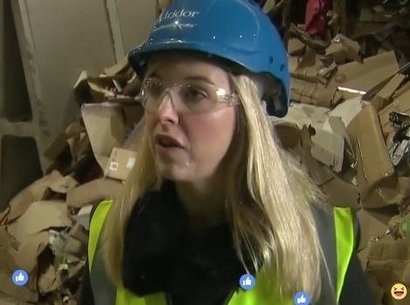
The report, ‘Going Round in Circles: Developing a new approach to waste policy following Brexit’ looks at the economic opportunity of a reformed resource policy. It looks at the importance of recovering energy from waste and the £280 million cost of exporting waste overseas. The report also looks at the additional £2 billion cost to British businesses and households of following proposed EU waste policies.
Policy Exchange argues that Brexit presents a huge opportunity for the Government to develop a new approach to waste and resources policy. Its report identifies significant shortcomings in the EU’s approach to waste and recycling, arguing that the objectives are increasingly unclear, the targets are badly designed, and the policies are not in the UK’s interest. Policy Exchange argues that rather than adopting the EU’s proposed ‘Circular Economy Package’, which it says would cost British businesses an extra £2 billion over the next twenty years, the British government should use Brexit to define its own approach to waste and resource policy. This should focus on maximising the resource productivity of the UK economy, in line with the Government’s emerging Industrial Strategy. It should also seek to minimise the carbon emissions and wider environmental impacts of waste management and resource use.
The report recommends that Household Waste Recycling Centres should act as collection points for reusable items, that Local Authorities should simplify the more than 400 systems currently operating across England and promote efficient forms of energy from waste, such as using black bag waste to produce biogas.
“This latest report from Policy Exchange is a hard-hitting reminder of the need to seize the opportunity to deliver a ‘Bespoke for Britain’ waste and resources policy post-Brexit” said Sarah Heald, Director of Corporate Affairs & Investor Relations for Pennon. “As a business investing £1.5 billion in energy recovery, recycling and waste management across the UK, we want to see strong waste and resources policies at the heart of the UK’s Industrial Strategy. This report speaks to the affordability challenge of EU recycling policy and the opportunity for a fresh focus on how best to deliver the UK’s environmental priorities in a cost-effective way.”
However, not everyone in the sector supports the conclusions reached by the Policy Exchange report. Supporters of the EU Circular Economy package argue that it will help to maintain a focus on improving recycling rates and supporting circular economy business models. They also argue that the UK has previously failed to develop more effective domestic waste policies, with the result that UK recycling rates lag behind many of the UK’s European competitors.
Speaking to Business Green yesterday (1st March), Dustin Benton of the think tank Green Alliance countered that the main flaw in the UK approach has little to do with EU regulations and more to do with lack of cooperation among UK Local Authorities.
“The UK has deeply confusing and contradictory recycling collections, but this is mainly because local authorities have opted to not cooperate” Mr Benton he said. “In contrast, other EU countries like Belgium make producers pay for a larger share of collection costs and give more control over collections, which has resulted in harmonised collection systems which cost 25 per cent less than the UK's fragmented system.”
Mr Benton also expressed doubts about Policy Exchange’s claim that Britain should focus on new energy from waste capacity, arguing instead that the current approach of exporting waste for generation is potentially environmentally beneficial.
“There's no environmental reason to oppose waste trade in principle” he said. “Sending waste to an energy facility on the continent that's hooked up to a district heating scheme has lower emissions than building a new UK energy from waste plant that just produces electricity - as most UK plants do. But the wider point is that recycling rates of 75 per cent to 85 per cent are possible - several Italian cities already achieve these. Far better to focus on innovation and design for recycling than to prematurely optimise on maximising contributions from energy from waste.”
This whole situation is further complicated by attitudes to environmental policy among the ‘Hard Brexit wing of the Conservative Party’ as editor-in-chief of Business Green, James Murray, put it in February. Mr Murray said that some Brexit supporters “continue to operate under the illusion climate change is a Commie plot and recycling is a socialist abomination”. He believes that they will not countenance any dictats on waste or carbon emissions from Brussels, especially if they come with the threat of enforcement proceedings and fines. Instead, pressure will be levied on the Government to strip environmental rules, including circular economy goals, from any new Brexit deal, as Theresa May finds herself “severely tempted to throw the right of the party some green red meat”.
Mr Murray further argues that the “logical thing to do is accept the EU standards and targets, sign up to the circular economy package as some form of associate member, and make high environmental standards a red line for the UK in any putative trade deal with the US, Australia, et al”.
All of which means this debate probably has a while to run yet, whatever Policy Exchange would ideally like to see happen.
Image: Sarah Heald, Pennon Group’s Director of Corporate Affairs, at Ford materials recycling facility (MRF) in West Sussex, explaining to Sky News in December 2016 why recycling matters
For additional information:

